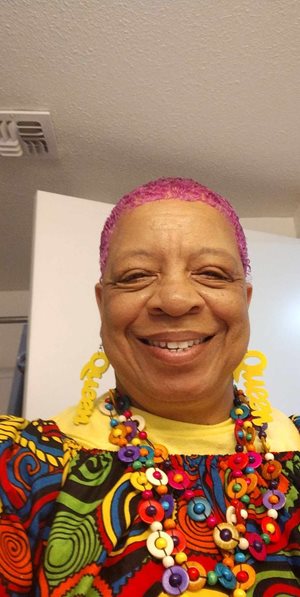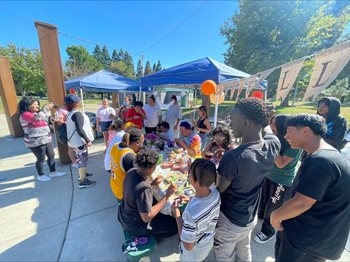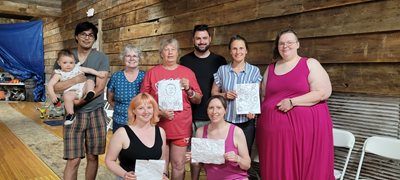Verna Erby-Ekpeduma has been a resident leader at Mutual Housing for the past decade. Now, she's also a teacher.
 Erby-Ekpeduma leads her neighborhood's Building Leaders, Building Community (BLBC) program, a leadership development experience that begins with NeighborWorks America, but is passed within neighborhoods from person to person. Erby-Ekpeduma says the program taught her about different types of leadership and how to talk to people as a leader. She took what she learned to a class of 13 more people in her Sacramento community.
Erby-Ekpeduma leads her neighborhood's Building Leaders, Building Community (BLBC) program, a leadership development experience that begins with NeighborWorks America, but is passed within neighborhoods from person to person. Erby-Ekpeduma says the program taught her about different types of leadership and how to talk to people as a leader. She took what she learned to a class of 13 more people in her Sacramento community.
NeighborWorks' Community Leadership Institute this past weekend celebrated five resident leaders through the Dorothy Richardson Award for Resident Leadership, so resident leadership was in the spotlight throughout October. But all year long, resident leadership is in the spotlight and a key part of both NeighborWorks America's 45 year history and the present, everyday work of network organizations working to strengthen their residents and communities.
The Building Leaders, Building Community program has been at the heart of NeighborWorks' resident leadership training for more than a decade, and the program was renewed and revamped in 2020. The first facilitator training took place in Fall 2021.
The exciting thing about it, says Sarah Parmenter, director of Community Building and Engagement for NeighborWorks, is that the program goes beyond training and includes relationship building. The leaders who take the training go back home and train others. "They bridge connections with others in the community," Parmenter says. "Residents are facilitating the sessions and bringing their expertise into the space. They're helping build trust." Twenty nine network organizations received grants from NeighborWorks America to receive facilitator training to use BLBC locally.
The curriculum is available in both English and Spanish. "Our organizations are already seeing impacts," she says. "They're seeing people show up, excited, and stay engaged afterward."
The program to train leaders has been used with youth, adults and older adults, in both rural and suburban areas. "It's amazing to see people make these connections across race, across gender, across age."
Erby-Ekpeduma says her group really bonded. People felt free to express themselves and ask questions. When the course was over, she says, the participants, who came from two of the apartment complexes owned and operated by Mutual Housing, were ready to lead.
"They teach us to not just help the people, but the community itself," she says. And the leadership that starts in the community goes with the participants to whatever they do, including their jobs, she adds.
Erby-Ekpeduma, who attended NeighborWorks Community Leadership Institute, describes leadership as service. "And it's a service helping other people to become leaders themselves. It's taking what you've learned and giving it back to someone else."
This month, Mutual Housing presented Erby-Ekpeduma with the organization's first resident leadership award. She is someone who has always liked working in the background, she says, but now she's ready to step to the front, too, to help her community. "When I first started, I couldn't look people in the eye. Now, I look people in the eye when I talk to them. Now, I know I'm a leader."
Sara Johnson, a senior community coordinator with Mutal Housing, says the program paired a new leader with Erby-Ekpeduma, who is established in the community, to do training in a development that sees a mix of ages and has a large contingent of Black and Latinx women.
leader with Erby-Ekpeduma, who is established in the community, to do training in a development that sees a mix of ages and has a large contingent of Black and Latinx women.
"Resident leaders and resident engagement are at the core of our organization," Johnson says. "We center their voices, their experiences, and what they want to engage in." That ranges from testifying in front of the state assembly to organizing BINGO, she says. Mutual Housing has community builders located in many of their 19 properties, who are responsible for engaging their community. Now, with the help of BLBC, more people can do that engagement.
Johnson adds that the organization saved part of its BLBC grant and had the residents going through the program vote on what to do with it, "as a way to step into their leadership." They voted on hosting a fall festival, which they held this month.
In Appleton, Wisconsin, there are 1,500 residences in the neighborhood known as Historic Central Downtown. But only a portion of residents involved in the work of connecting community to each other and to events, like Porchfest and a Halloween decorating contest. Only a portion are banding together on issues that they, as a community, face.
The BLBC program is helping change that, says Brianne Connelly, a resident leader who, with the help of NeighborWorks Green Bay, is teaching others in Appleton to become resident leaders as part of an effort to increase community involvement. Connelly, who was a teacher before BLBC (she taught middle school art and still serves as a fitness instructor) seemed like a natural to go through the "train the trainer programing." She was ready to engage with the program and to share it with a group of residents she calls "the core team."
 From that small group, one person has gone on to form a book group. Another is bringing together residents interested in making the community more friendly to pedestrians. A third is forming a craft group.
From that small group, one person has gone on to form a book group. Another is bringing together residents interested in making the community more friendly to pedestrians. A third is forming a craft group.
Connelly says the lesson from the program that has stuck with her the most was the one called "Head, hands, heart." "It helps you connect with people," she says. The head refers to what you can offer the community from your brain; the hands is what you can build with your hands; the heart is your passion.
"It's an easy way to get to know people – and not on a superficial level," she says. "I've been meeting with the core group for years. Doing BLBC discussions let me get to know them much better than before."
And that's just one of the points, says Beckah Terlouw, a strategist who updated the program curriculum for NeighborWorks America. "We are able to spread education and development at a local level, and we are able to recognize and honor that residents are knowledgeable experts on their own experiences and on what they want in their communities."
Every community is bursting with gifts – with talents and passions, she says. "We thought we'd start by seeing what's working, and then utilize and enhance or expand those assets to do more of what make a community great."
Adds Connelly, "You put it into the world and see what happens from there."
10/30/2023

